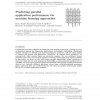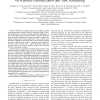131 search results - page 1 / 27 » Predicting parallel application performance via machine lear... |
CONCURRENCY
2007
13 years 5 months ago
2007
ISPASS
2009
IEEE
2009
IEEE
Machine learning based online performance prediction for runtime parallelization and task scheduling
13 years 11 months ago
—With the emerging many-core paradigm, parallel programming must extend beyond its traditional realm of scientific applications. Converting existing sequential applications as w...
ICPP
2006
IEEE
13 years 11 months ago
2006
IEEE
Modeling the performance behavior of parallel applications to predict the execution times of the applications for larger problem sizes and number of processors has been an active ...
CLUSTER
2007
IEEE
13 years 9 months ago
2007
IEEE
Abstract-- Multicore microprocessors have been largely motivated by the diminishing returns in performance and the increased power consumption of single-threaded ILP microprocessor...
AICCSA
2006
IEEE
13 years 7 months ago
2006
IEEE
In this paper we apply a machine learning approach to the problem of estimating the number of defects called Regression via Classification (RvC). RvC initially automatically discr...


